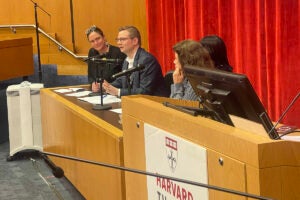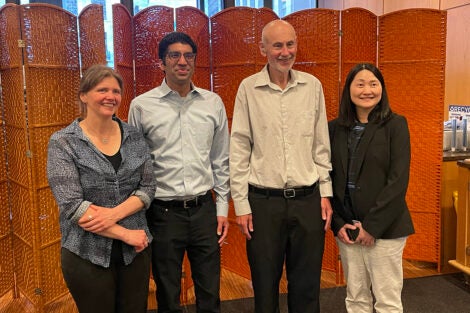May 18, 2023—Members of the Department of Biostatistics recently gathered for a symposium celebrating the 50-year career of Victor De Gruttola, former chair and professor of biostatistics emeritus. De Gruttola is known for his contributions to the development and application of statistical methods in HIV/AIDS research, including on estimating the risk that children of HIV-infected mothers would develop AIDS in the first 10 years of life.
Throughout the symposium, which was held May 12 in Kresge G1, colleagues and former students praised his influential work, supportive mentorship, and infectious curiosity about a wide variety of subjects. Two panel discussions focused on learning from global efforts to address pandemics and preparing the next generation of quantitative scientists.
Andrea Foulkes, professor in the Department of Biostatistics and a former advisee, gave an overview of De Gruttola’s career, noting that he received a prestigious first grant award from the National Institutes of Health in 1989 for his work on statistical modeling a progression of HIV infection. The project was continuously funded for 17 years on the original grant, and one year received an NIH merit award. She described De Gruttola as a relationship builder, who worked effectively with collaborators from around the world on studies such as the Botswana Combination Prevention Project, and with leaders and activists from communities affected by the AIDS epidemic. Foulkes noted that he had always been deeply motivated to address issues of concern to vulnerable populations.

Speaking on the first panel, Eric Tchetgen Tchetgen, a Harvard Chan School graduate and former faculty member now at The Wharton School of University of Pennsylvania, said that De Gruttola has had a life-changing impact on his professional career. “One of the things that I learned from him as a statistician, is insisting that you be a scientist,” he said. “It’s not a service job. You have to be invested in the science and learn, understand, and contribute to that conversation.”
He and other panelists discussed the challenges of designing trials to evaluate medical therapies for infectious diseases about which knowledge is rapidly evolving—a challenge during the early days of both HIV/AIDS and COVID-19. Looking ahead to potential future pandemics, Kenneth Mayer, professor in the Department of Global Health and Population, hoped that there would be political will to invest in infectious disease surveillance using wastewater technology. He called on quantitative scientists to develop test cases to show how such data might be able to be used, and to work with other colleagues to lobby policymakers around this issue.

During the second panel, speakers discussed finding ways to help students identify research gaps where they might be able to make meaningful contributions with their theses. Panelists also raised the challenges researchers have accessing high quality data, and the need for methodological expertise to interpret messy data sources.
Shahin Lockman, associate professor in the Department of Immunology and Infectious Diseases, recalled working with De Gruttola on various studies and observing the way he interacted with colleagues and other stakeholders. Coming out of the COVID-19 pandemic, “we need to just continue to build on teamwork and community,” she said. “We can have the best or the worst data, but without teamwork and optimal communication we’re nowhere.”
De Gruttola closed the event with warm personal remarks. After thanking those who contributed to the symposium and offered well-wishes in a tribute video, he said, “I would suggest that we think about the beautiful opportunity we have to use mathematical ideas, ideas from the computational and algorithmic sciences, genomics, and molecular biology, the opportunity to work in these areas with such wonderful colleagues, and to do it all to protect vulnerable people. That to me is an extraordinary, beautiful experience.”
Photos: Shaina Andelman
